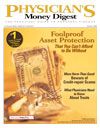Publication
Article
How Much Are You Being Charged in Fees?
Author(s):
Recently I was contactedby a physician in the localsouth Florida area whohad read one of mymonthly columns andwas seeking advice on analyzing theperformance of his trust account. Thereason for the inquiry was that hisinvestment portfolio had not appreciatednoticeably during the last 3 years. Atfirst glance, this may sound a bit unusual,but given the recent performance ofa sluggish stock market, I did not find itout of the realm of possibility. Uponexamining the individual holdings, Inoticed that many were reasonablysound investments. His portfolio wascomprised of roughly 33% individualinvestment-grade bonds, 65% individualdomestic equities (ie, stocks), andthe remainder was in cash. From theinvestments held, I would have consideredthe account fairly balanced.
Portfolio Investigation
He provided me with his investmentstatements that went back to the thirdquarter of 2003. At that time, the currentvalue of his account had been justshy of $900,000. As of July 31 of thisyear, the value of the account was justover $900,000. The appreciation of theportfolio had been just under $30,000—virtually static over the past 3 years.During this time, he had made nodeposits to the account and had madeonly one withdrawal of $6000 duringMay of this year. The account had beenmanaged by a family friend of nearly 30years. There had been very littleturnover in the portfolio. In fact, mostof the investments held in the trustaccount had been there since the thirdand fourth quarters of 2003. Whencompared against the benchmark S&P500, the percentage weighting amongeconomic sectors was not skewed withthe exception that the portfolio hadbeen a bit more heavily weightedtoward financials. Other than that,nothing appeared out of the ordinary.
So where was the problem? I analyzedhis portfolio utilizing a programpublished by Morningstar, Inc. What Ifound was that the compounded annualizedrate of return on the portfolioshould have been in the range of 7%over the 3-year period. To put this intoperspective, unadjusted for taxes andfees, $900,000 would have grown intonearly $1.1 million during this timeframe. However, this is misleadingbecause there are going to be taxesincurred on interest and dividendincome generated. Also, there are managementfees that would also havebeen incurred.
Overflow of Fees
Upon further investigation, his trustaccount was being assessed a quarterlyfee that equated to a whopping 3%annual asset management fee chargedby his financial advisor. By most standards,I would consider such a fee exorbitant.Furthermore, the responsibilityof managing the account was assumedby a third-party money manager whowas charging an additional 2.25%annually. We are now up to 5.25% inannual fees and expenses. Last, but notleast, the trust company was chargingan additional 1.5% annually for actingas trustee of the account. The fees totaling6.75% were being assessed on histrust account annually, which offset anypotential appreciation of the underlyinginvestments in the portfolio.
All physician-investors should havean objective third party review theirportfolio no less than semiannually andcompare the performance against theappropriate benchmarks. In addition,do not be shy to ask for an annualaccounting of all fees and expensesaccrued by your account. And lastly, Iwould always suggest using someoneother than a family friend or relative asyour advisor. Remember the old adage"blood is thicker than water"? I amwilling to wager that this was coined byan undeserving relative.
Thomas R. Kosky and his partner, Harris L.Kerker, are principals of the Asset Planning,Group, Inc, in Miami, Fla. The companyspecializes in investment, retirement, andestate planning. Mr. Kosky also teaches corporatefinance in the Saturday Executive and Health CareExecutive MBA Programs at the University of Miami in CoralGables, Fla. Mr. Kosky and Mr. Kerker welcome questions orcomments at 800-953-5508 or e-mail Mr. Kosky directly atProfessorKosky@aol.com.
